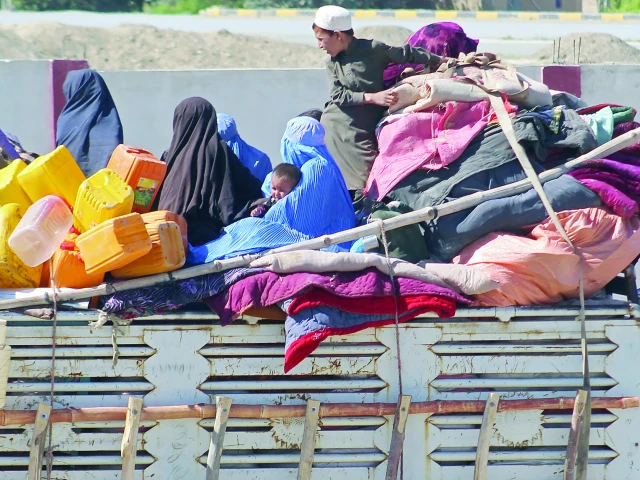More than 100,000 Afghans left Pakistan in April
Drive is part of a larger campaign that govt launched in 2023

More than 100,000 Afghans have left Pakistan in the past three weeks, the interior ministry said Tuesday, after Islamabad announced the widespread cancellation of residence permits.
The drive is part of a larger campaign that the government began in 2023 to repatriate all illegal foreigners. Under the first phase, all undocumented Afghans were deported, those who did not have identity proof.
Analysts say the expulsions are designed to pressure neighbouring Afghanistan's Taliban authorities, which Islamabad blames for fuelling a rise in border attacks.
The interior ministry told AFP that "100,529 Afghans have left in April".
Convoys of Afghan families have been heading to the border since the start of April when the deadline to leave expired, crossing into a country mired in a humanitarian crisis.
"I was born in Pakistan and have never been to Afghanistan," 27-year-old Allah Rahman told AFP at the Torkham border on Saturday.
"I was afraid the police might humiliate me and my family. Now we're heading back to Afghanistan out of sheer helplessness."
Afghanistan's prime minister Hasan Akhund on Saturday condemned the "unilateral measures" taken by its neighbour after Pakistan's Foreign Minister Ishaq Dar flew to Kabul for a day-long visit to discuss the returns.
Akhund urged the Pakistani government to "facilitate the dignified return of Afghan refugees".
Many people are leaving voluntarily, choosing to depart instead of face deportation, but the UN refugee agency UNHCR said that in April alone, more arrests and detentions took place in Pakistan -- 12,948 -- than in all of last year.
Pakistan's security forces are under enormous pressure along the border with Afghanistan as they battle a growing insurgency by terrorists in Balochistan in the southwest, and the Pakistani Taliban and its affiliates in the northwest.
Last year was the deadliest in Pakistan in a decade.
The government has frequently said that Afghan nationals take part in attacks and blames Kabul for allowing terrorists to take refuge on its soil, a charge Taliban leaders deny.
Millions of Afghans have poured into Pakistan over the past several decades fleeing successive wars, as well as hundreds of thousands since the return of the Taliban government in 2021.
Some Pakistanis have grown weary of hosting a large Afghan population as security and economic woes deepen, and the deportation campaign has widespread support.
"They came here for refuge but ended up taking jobs, opening businesses. They took jobs from Pakistanis who are already struggling," 41-year-old hairdresser Tanveer Ahmad told AFP as he gave a customer a shave.
More than half of Afghans being deported were children, the UNHCR said on Friday. The women and girls among those crossing were entering a country where they are banned from education beyond secondary school and barred from many sectors of work.
In the first phase of returns in 2023, hundreds of thousands of undocumented Afghans were forced across the border in the space of a few weeks




















COMMENTS
Comments are moderated and generally will be posted if they are on-topic and not abusive.
For more information, please see our Comments FAQ